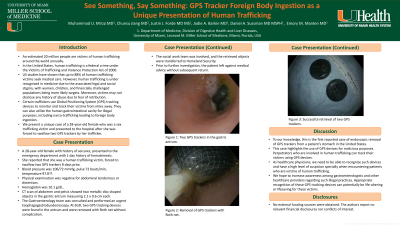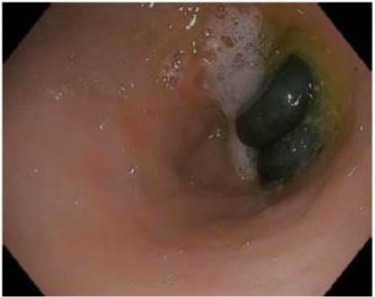Back


Poster Session B - Monday Morning
Category: Stomach
B0714 - See Something, Say Something: GPS Tracker Foreign Body Ingestion as a Unique Presentation of Human Trafficking
Monday, October 24, 2022
10:00 AM – 12:00 PM ET
Location: Crown Ballroom

Has Audio
- MM
Muhammad U. Mirza, MD
University of Miami, Jackson Memorial Hospital
Miami, FL
Presenting Author(s)
Award: Presidential Poster Award
Muhammad U. Mirza, MD1, Chunsu Jiang, MD1, Justin J. Forde, MD1, Jodie A. Barkin, MD2, Daniel A. Sussman, MD3, Emory Manten, MD4
1University of Miami, Jackson Memorial Hospital, Miami, FL; 2University of Miami, Miller School of Medicine, Miami, FL; 3University of Miami, Miami, FL; 4Miller School of Medicine, University of Miami, Miami, FL
Introduction: An estimated 20 million people are victims of human trafficking around the world annually. In the United States, human trafficking is a federal crime under the Victims of Trafficking and Violence Protection Act of 2000. US studies have shown that up to 88% of human trafficking victims seek medical care. Therefore, as physicians we have a unique opportunity to recognize these acts and potentially intervene. The human gastrointestinal cavity is often used for illegal purposes, such as narco-trafficking leading to foreign body ingestion. We present a unique case of a 28-year-old female who was a sex trafficking victim and presented to the hospital after she was forced to swallow two global positioning system (GPS) trackers by her traffickers.
Case Description/Methods: A 28-year-old female with history of seizures, presented to the emergency department with 1 week of hematemesis. She reported that she was a human trafficking victim, forced to swallow two GPS trackers 8 days prior. Blood pressure was 106/72, pulse 67, temperature 97.8 °F . Physical examination was negative for abdominal tenderness or distention. Hemoglobin was 10.1 g/dL. CT scan of abdomen and pelvis showed two metallic disc shaped objects in the gastric antrum measuring 2.1 x 0.6 cm each. The gastroenterology team was consulted and performed an urgent esophagogastroduodenoscopy. At EGD, 2 “TILE” tracking GPS devices were found in the antrum, and were removed with Roth net without complication. The social work team was involved, and the retrieved objects were transferred to Homeland Security. Prior to further investigation, the patient left against medical advice, without subsequent return.
Discussion: To our knowledge, this is the first reported case of endoscopic removal of GPS trackers from a patient’s stomach in the US. This case highlights use of GPS devices for malicious purposes and the clinical challenges posed for healthcare providers. Human trafficking is underrecognized in medicine due to the associated legal and social stigma, with women, children, and financially challenged populations being more likely targets. Victims may not disclose any history of abuse due to fear of retribution. Physicians should have a high level of suspicion when potentially encountering such patients as one interaction and physician intervention may be potentially life-altering or lifesaving for victims of human trafficking.

Disclosures:
Muhammad U. Mirza, MD1, Chunsu Jiang, MD1, Justin J. Forde, MD1, Jodie A. Barkin, MD2, Daniel A. Sussman, MD3, Emory Manten, MD4. B0714 - See Something, Say Something: GPS Tracker Foreign Body Ingestion as a Unique Presentation of Human Trafficking, ACG 2022 Annual Scientific Meeting Abstracts. Charlotte, NC: American College of Gastroenterology.
Muhammad U. Mirza, MD1, Chunsu Jiang, MD1, Justin J. Forde, MD1, Jodie A. Barkin, MD2, Daniel A. Sussman, MD3, Emory Manten, MD4
1University of Miami, Jackson Memorial Hospital, Miami, FL; 2University of Miami, Miller School of Medicine, Miami, FL; 3University of Miami, Miami, FL; 4Miller School of Medicine, University of Miami, Miami, FL
Introduction: An estimated 20 million people are victims of human trafficking around the world annually. In the United States, human trafficking is a federal crime under the Victims of Trafficking and Violence Protection Act of 2000. US studies have shown that up to 88% of human trafficking victims seek medical care. Therefore, as physicians we have a unique opportunity to recognize these acts and potentially intervene. The human gastrointestinal cavity is often used for illegal purposes, such as narco-trafficking leading to foreign body ingestion. We present a unique case of a 28-year-old female who was a sex trafficking victim and presented to the hospital after she was forced to swallow two global positioning system (GPS) trackers by her traffickers.
Case Description/Methods: A 28-year-old female with history of seizures, presented to the emergency department with 1 week of hematemesis. She reported that she was a human trafficking victim, forced to swallow two GPS trackers 8 days prior. Blood pressure was 106/72, pulse 67, temperature 97.8 °F . Physical examination was negative for abdominal tenderness or distention. Hemoglobin was 10.1 g/dL. CT scan of abdomen and pelvis showed two metallic disc shaped objects in the gastric antrum measuring 2.1 x 0.6 cm each. The gastroenterology team was consulted and performed an urgent esophagogastroduodenoscopy. At EGD, 2 “TILE” tracking GPS devices were found in the antrum, and were removed with Roth net without complication. The social work team was involved, and the retrieved objects were transferred to Homeland Security. Prior to further investigation, the patient left against medical advice, without subsequent return.
Discussion: To our knowledge, this is the first reported case of endoscopic removal of GPS trackers from a patient’s stomach in the US. This case highlights use of GPS devices for malicious purposes and the clinical challenges posed for healthcare providers. Human trafficking is underrecognized in medicine due to the associated legal and social stigma, with women, children, and financially challenged populations being more likely targets. Victims may not disclose any history of abuse due to fear of retribution. Physicians should have a high level of suspicion when potentially encountering such patients as one interaction and physician intervention may be potentially life-altering or lifesaving for victims of human trafficking.

Figure: Two GPS trackers in the gastric antrum
Disclosures:
Muhammad Mirza indicated no relevant financial relationships.
Chunsu Jiang indicated no relevant financial relationships.
Justin Forde indicated no relevant financial relationships.
Jodie Barkin: AbbVie – Advisor or Review Panel Member. Aimmune Therapeutics, a Nestlé Health Science company – Consultant. CorEvitas, LLC – Advisor or Review Panel Member. Envara Health – Advisor or Review Panel Member. Medtronic – Advisor or Review Panel Member.
Daniel Sussman indicated no relevant financial relationships.
Emory Manten indicated no relevant financial relationships.
Muhammad U. Mirza, MD1, Chunsu Jiang, MD1, Justin J. Forde, MD1, Jodie A. Barkin, MD2, Daniel A. Sussman, MD3, Emory Manten, MD4. B0714 - See Something, Say Something: GPS Tracker Foreign Body Ingestion as a Unique Presentation of Human Trafficking, ACG 2022 Annual Scientific Meeting Abstracts. Charlotte, NC: American College of Gastroenterology.

